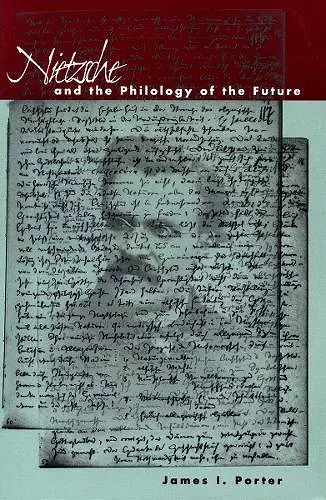Nietzsche and the Philology of the Future
Reassessing Nietzsche's Early Works and Their Philosophical Implications
Format:Hardback
Publisher:Stanford University Press
Published:1st Jan '02
Currently unavailable, and unfortunately no date known when it will be back
This hardback is available in another edition too:
- Paperback£35.00(9780804736985)

This book reexamines Nietzsche's early writings, arguing that his philological insights remained vital throughout his philosophical evolution in Nietzsche and the Philology of the Future.
In Nietzsche and the Philology of the Future, the author delves into Nietzsche's early notebooks and correspondence to challenge the conventional view of him as a philosopher who turned away from classical philology. By examining the connections between Nietzsche's early and later thoughts, the book reveals how the themes present in his earliest writings resonate throughout his later philosophical pursuits. This exploration aims to disrupt the prevailing narrative that Nietzsche transitioned from a precritical to an enlightened phase, suggesting instead that his engagement with philology remained a constant throughout his career.
The work also questions the tendency to view The Birth of Tragedy as a pivotal moment in Nietzsche's intellectual journey. The author argues that Nietzsche's inquiries into religion, art, and history are deeply intertwined with broader questions of knowledge and culture. The early writings show that Nietzsche struggled to disentangle modernity from antiquity, indicating that his concerns with classical philology were always present, even in his later works. This perspective invites readers to reconsider how we characterize Nietzsche and the implications of his philosophical evolution.
Furthermore, the author posits that Nietzsche’s investigation into the intersections of philosophy and philology reflects modern cultural ideologies and practices. By framing his work as a form of cultural anthropology, Nietzsche offers insights into the complexities of identity formation as influenced by historical processes. The book presents a nuanced understanding of how cultural inheritances, particularly those from classical antiquity, shape the modern subject, revealing the intricate dynamics of transmission and interpretation that inform our contemporary existence.
"Students of Nietzsche will welcome this fine study, which focuses on the philosopher's early philological writings in order to demonstrate that there is far more continuity in the Nietzschean oeuvre than is often thought. . . . Highly recommended for all upper-division undergraduates and above." -- Choice
"This is an excellent book, exhaustively documented and subtly written. Its greatest contribution will probably be to students of Nietzsche, for whom it presents cogent, intelligent readings of under-discussed material. But it should not be ignored by classical philologists, for whom it will serve as a challenge and a source of strength. Books like this, and debates about them, will help foster a dialogue between students of ancient and modern philosophy and literature that is weaker than it should be." -- Bryn Mawr Classical Review
"This work will be of interest to, and should be studied by, a wider audience than its title may initially suggest . . . .Porter's provocative readings . . . .convincingly demonstrate the need for more attention to this largely neglected area of Nietzsche's writing." -- The Review of Metaphysics
ISBN: 9780804736671
Dimensions: unknown
Weight: unknown
472 pages